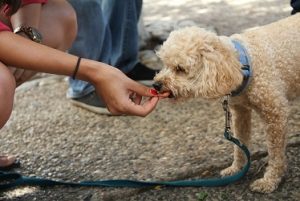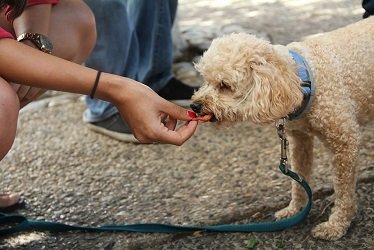Chewing is important for all dogs whether puppies or adults. When your dog doesn’t chew its food, you need to find out the reason because every dog, tame or wild, chew their food before eating. Although they don’t chew like us but Swallowing at once, has its own disadvantages. So you must train your dog to chew its food properly (in a dog manner).

Why dog doesn’t chew food?
Chewing is like instinct and if your dog is not masticating properly then there could be various reasons. You must understand, that chewing is vital. Biting the food into smaller pieces makes the food easier to swallow and digest. If your dog inhales food without chewing, it can simply be stuck in its throat and choke your dog. Ouch!
Your dog is maybe not munching the food properly because
It’s hungry!
When a dog stays hungry for a longer time, the food will taste yummier (try it yourself). Naturally, it will eat food greedily. It will swallow the bites in hurry to eat more and more. This is also encoded in their gene by their wild ancestors who had to eat in hurry and move to safer places. However, gulping instead of chewing is not the safest idea. It could be dangerous and your dog can end up throwing whatever it eats.
Swelling in gums
I remember when my wisdom tooth was coming and my gums were swollen. It is so hard to chew the food when there is a swelling in the mouth. Check your dog for gum swelling to rule out the option. If its gums are swollen, your sweet pup is in pain.
Oral diseases
Oral dysphagia in the mouth can cause paralysis of the jaw or tongue causing the chewing muscles to get paralyzed. Your dog will have difficulty in crunching the food resulting in swallowing it as a whole.
Inflammation or infection
Any inflammation or infection in the mouth or tongue will also cause difficulty in chewing.
Stress
Imagine eating in peace, taking a bite after another, and enjoying the food to its fullest. Well, stress can reverse the process. In stress, your dog may start swallowing the food and you must know that he is doing it unintentionally as we do in stress. Try to find the reason behind stress and calm your dog.
What if a dog doesn’t chew food?
Is it bad? Yup! There could be many health concerns if your dog doesn’t chew food properly. Devouring the food as a whole can cause many problems like gas, bloating, upset stomach, and even vomiting.
In rare cases, when your dog doesn’t chew food properly, larger bites can cause the stomach lining to stretch and twist. This could rupture the stomach and can be fatal too. The condition is called gastric dilation or volvulus
How to train your dog to chew food
If your dog is not chewing properly, you can train your dog to do it. You can start this by
Breaking food into portions
Feed your dog in smaller portions. This way he will stop consuming the food as a whole. Even if he is hungry he will not have a lot to eat.
Use slow feeder
There are specially designed plates for dogs that slow down their eating process. Feed your puppy on that plate to train him to chew food.
Moisten the food
Dogs tend to swallow dry food more than wet food and also it’s easy for the dog to do so. Dry food doesn’t stick in the mouth like a wet one. Dogs have a jaw shape that is naturally designed in such a way that they can gulp food without chewing. So moistening the food a bit can encourage your dog to chew it.
Give him privacy
Dogs are touchy when it comes to their food. When they sense someone is gonna share with them, they try to eat more to get a bigger share. Giving him privacy gives him a sense of security that the food is all his and he can eat it at peace. This will slow down the eating process encouraging the dog to chew bites. Also if you are a dog parent of multiple dogs, feed every dog in separate containers.
Divert the attention
It’s easy to divert your dog’s attention during eating. Give him incentives that could make your dog busy compelling him to avoid giving attention to food. You can give him food in a puzzle toy and catchy containers. Your dog will start playing and rolling the container.
You can also design your own puzzle-like put some toy in food and your dog has to remove the toy before eating the next bite. It will slow him down.
Sometimes dog eats slow but doesn’t chew. You should know that dog’s anatomy doesn’t allow it to eat like us. Neither the jaw movements nor the saliva in its mouth works as it does in humans. The dog’s jaw is designed in such a way that the food can reach to stomach. So don’t expect your dog to ruminate however you can slow the eating process to discourage swallowing with the above-mentioned tricks.
These tricks work best if small dogs don’t chew food but
What if an older dog doesn’t chew food?
Well, older buddies not chewing food can have other reasons too like their teeth are not as strong as they were once. With bad teeth, swallowing seems like a shortcut.
Aging has its gifts. It comes with deterioration of teeth which can lead to cavities and other oral diseases that must be cured. With age, the dog’s teeth become more sensitive and the dog finds difficulty in chewing.
An adult dog must be fed soft food to help them in the chewing process but soft food is not always the solution. If your dog suffers from tooth decay or gingivitis, we advise you to talk to a professional.
Dog doesn’t want to chew food
Trick him if your dog doesn’t want to chew food and swallows kibble without chewing. Try to buy dog food with smaller kibble sizes. At least the risk of choking will be minimized.
Another working trick is that spread the food all over the floor. The dog will take time in eating it all. This way you can help your dog to focus on chewing rather than swallowing the whole food.
In short, slowing down your dog is the best thing you can do to stop your dog from swallowing the food. It might not chew like us but grinding the food before passing it to a stomach is important for a dog’s health.

